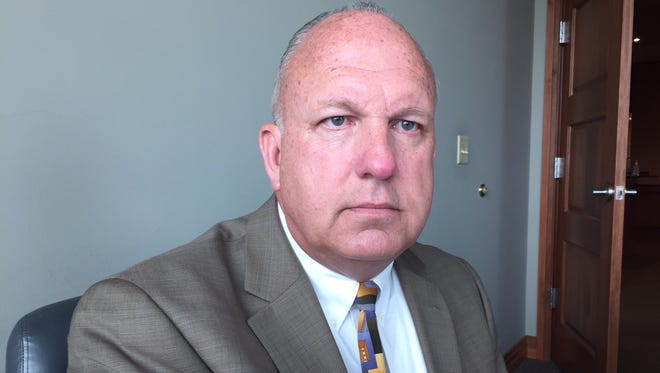LANSING — The head of internal affairs at the Michigan Department of Corrections says an official who works closely with Director Heidi Washington has micro-managed his department and improperly attempted to change the results of investigations into alleged prison wrongdoing.
And Washington may now be required to testify in a lawsuit in Jackson County Circuit Court.
Stephen Marschke, who heads internal affairs, testified in a November deposition that Kathy Warner, who is in charge of the Office of Executive Affairs and oversees his office, even instructed him in 2018 to change the finding of an investigation into accusations a deputy warden made against Warner and Washington from “insufficient evidence” to sustain charges to “no evidence.”

Marschke refused, but soon learned that Warner had successfully directed one of his investigators to similarly change the determined outcome of two other cases, and had even directed his secretary to change the conclusion that he, Marschke, had arrived at in another investigation.
“I am very uncomfortable having been placed in such a compromising position involving my immediate supervisor,” Marschke, a former Berrien County sheriff who chaired the Michigan Parole Board under former Gov. John Engler, said in a July 1, 2018, memorandum to Washington.
“Department employees want, and are certainly entitled to, a fair and ethical investigation; where they have confidence in not only the investigative process, but their belief that Internal Affairs is above board in everything taking place during the investigation.”
Now, an attorney for two prison employees — determined by a hearing officer to have been improperly fired after trumped-up investigations into their alleged violations of work rules — wants Washington to testify about her involvement in the cases, records show.
Brent Rohrig and Vicki McCabe, two unit managers at Cotton Correctional Facility near Jackson, sued the department, Washington, Warner, and other prison officials in January, alleging the defendants ruined their careers and violated their constitutional rights.
The department has denied the allegations, and “denies all allegations of interference and impropriety in internal affairs investigations,” Chris Gautz, a spokesman for Washington, said in a Friday email. Warner did not respond to an email seeking comment. Ryan Jarvi, a spokesman for the Attorney General’s Office, declined to comment on Marschke’s allegations, citing the ongoing litigation.
Rohrig and McCabe were out of work for 18 months after the department fired them in May 2017. Both were fired for deleting a few emails that should have been turned over, with thousands of others they did produce, in response to a Michigan Freedom of Information Act request submitted by a deputy warden.
The reason the FOIA request was filed is not clear from the record, but Rohrig and McCabe were among several employees told to search their emails for certain key words and emails exchanged between specific employees. Both denied deleting emails but said some could have been overlooked or omitted when duplicated using a scanner.
Attorneys for the state have refused to schedule a deposition for Washington, and Detroit attorney Jonathan Marko last week filed a motion to compel her testimony.
In 2018, Michigan Civil Service Commission Hearing Officer Matthew Wyman ordered the department to give Rohrig and McCabe their jobs back, restore their seniority and give them full back pay for the time they were off work. Wyman said the charges against Rohrig, who in 2015 had filed a federal complaint about Warner and the department’s procedures, were “the essence of disparate, arbitrary, disproportionate discipline.” McCabe was “collateral damage” in the case, according to her attorney at the time.
Wyman found there was no proof Rohrig or McCabe intentionally deleted emails and the discipline was out of proportion, since at least one other employee who did not properly turn over emails for a FOIA request received no discipline at all.
Marschke, who is also a defendant in the lawsuit, was an unsuccessful applicant for Warner’s job, and is scheduled to retire Jan. 8. He testified that Warner, who is the department’s former discipline coordinator and whom Rohrig accused of uneven discipline in a 2015 discriminatory harassment complaint to the Equal Employment Opportunity Commission, took a strong interest in the Rohrig investigation and wanted constant updates about the progress of the case.
Rohrig alleges the internal affairs investigator who handled the 2016 case involving his emails, Lachelle Fuller, had a conflict of interest because Rohrig had already accused her ex-husband, who was a corrections officer at Cotton until he was fired for smuggling in 2018, of bringing contraband to prisoners. The suit alleges Warner chose Fuller to investigate Rohrig and giving Fuller access to his emails put Rohrig, his family, and prisoners who had confidentially informed on her ex-husband, at risk.
Marschke, who was removed as head of internal affairs in what was described as a cost-saving move after May 2012 but returned in September 2016, testified that Fuller was assigned to the Rohrig case before he returned to the department and it could have been Warner, who was then overseeing a different head of internal affairs, who gave her the assignment.
Marschke testified that when he learned of the conflict involving Fuller, her ex-husband, and Rohrig, Fuller was close to wrapping up her investigation and was allowed to complete it, while a second, related investigation was given to a different investigator.
Though Marschke had complained about what he calls isolated “gotcha” investigations with predetermined outcomes under former director Dan Heyns, he testified that the administration had generally taken a hands-off approach to his investigations during his first 10-year stint.
“When I came back it was — the whole direction of internal affairs had changed and Kathy was the deciding authority figure for everything,” inserting herself in investigations to the point where he was finding it difficult to run the department, Marschke testified.
Warner wanted to sign off on which investigators were assigned to which cases and even sent out a directive that everyone in internal affairs needed to report to her before giving court depositions or testimony “so that she made sure that nothing was missed and stuff,” Marschke testified.
“I didn’t think that was proper and I told her so,” Marschke said in his deposition.
Rohrig complained to Washington “multiple times with concerns about corruption within the internal affairs investigations of his complaints and with worries about retaliatory actions he suffered at the hands of defendants,” Marko said in a Dec. 15 court filing, arguing why Washington should be required to testify.

“Washington was privy to and approved of the retaliatory investigations and actions taken against plaintiffs,” and “has unique and personal knowledge about the corruption going on within the internal affairs investigative process,” Marko wrote.
On Oct. 21, 2016, Rohrig emailed Washington, alleging corruption in the ongoing internal affairs investigations and complaining about Fuller investigating him.
“I’ve repeatedly asked I be allowed to perform my duties without the ongoing harassment and retaliation,” he wrote. “The department’s own internal investigations sustained my complaints, and I am still being targeted for unjust scrutiny for reporting rule violations and risks to the public.”
Because of concerns raised by Rohrig, which included Rohrig’s previous complaint against Warner, “I went over her head and I went to the director,” Marschke testified.
He forwarded Washington an email from Rohrig, without sending it to Warner, and asked for direction.
Shortly after, on Oct. 28, 2016, he went to Warner’s office about something else and she immediately began questioning him about the Rohrig investigation, asking him in an accusatory manner whether Marschke had received any information from Rohrig that he had not informed her about, Marschke testified.
“It was bizarre,” Marschke said in his deposition.
“I think she sensed that I had said something to the director,” and he admitted to her that he had sent Rohrig’s letter to Washington, seeking direction.
On Oct. 29, Marschke sent Washington a memo, saying Warner was improperly inserting herself into internal affairs investigations and had questioned him accusingly.
However, “I don’t think the director ever did anything with my memo,” and did not respond to it, Marschke testified.
Marschke, who testified he was not aware of the history between Rohrig and Warner until he received the 2016 email from Rohrig, ended his memo to Washington by expressing concern that he — the head of internal affairs — would be the target and victim of the department’s next “gotcha” investigation.
He testified he does not believe the same person should be overseeing internal affairs investigations and how the department metes out discipline.
“To equitably discipline somebody, you wouldn’t want internal affairs in there giving their two cents on it,” he testified. “That would be like the police going into the judge’s conference room and saying, well this is what I believe you ought to do, judge.”
Marschke has complained to Washington more recently about Warner interfering in internal affairs investigations.
Marschke sent Washington a memo on June 24, 2018, after an internal affairs investigation determined there was insufficient evidence to support a deputy warden’s allegations against Warner and Washington.
“On Thursday morning (6/21/18), Kathy came into my office, shut the door, and demanded I change the decision in her case from insufficient evidence to no evidence,” Marschke wrote in the memo.
The investigation related to numerous allegations made by Deputy Warden David Fenby against Warner and Washington, including that they had “corrupted the disciplinary process,” and that Warner had manipulated investigations, changed outcomes, and told investigators what to write in investigative packets, according to Marschke’s memo.
Marschke testified he told Warner that another administrator who had reviewed the case, Deputy Director Russ Marlan, voted the same way as he had on the “insufficient evidence” finding. Warner then instructed Marschke’s secretary to contact Marlan and tell him to change his finding as well, he said.
“What concerns me the most is the unusual demand by Kathy to change the decision in a case where she is listed as a suspect,” Marschke said in the memo to Washington.
“This is not only self-serving but very troubling and highly inappropriate. No other employee considered a suspect would ever have the power to call Internal Affairs and demand a different outcome in their case.”
Washington wrote him back saying the finding of “insufficient evidence” would not be changed, Marschke testified.
Then, just one week later, on July 1, 2018, Marschke sent Washington another memo, alleging that Warner told one of his investigators to similarly change his conclusions in two investigations, which the investigator did, and had changed Marschke’s votes on the finding of one investigation without his knowledge. In all those cases, the finding was changed from “insufficient evidence” to “no evidence.”
“This issue now creates a serious ethical concern for me,” Marschke wrote Washington.
The incident “has far-reaching implications for Internal Affairs,” and changing someone else’s vote would appear to violate work rules, Marschke wrote.
Though he had found there was insufficient evidence to support Fenby’s allegations about manipulating investigations, changing outcomes, and telling investigators what to write, what Fenby alleged now “appears to be true,” Marschke wrote.
Paul Egan, Detroit Free Press
- Laker Men’s Basketball Handle Kuyper 88-55 - December 23, 2024
- MYWAY Sault Bridge Brawl & NEMWA Regional Results - February 22, 2024
- Crawford County Prosecutor clears State Trooper in the fatal shooting of man earlier this month - February 23, 2023




I think what you said made a ton of sense. But, what about this?
suppose you added a little information? I ain’t saying your content is not good.,
but suppose you added something to possibly grab a person’s attention? I
mean Michigan prison internal affairs chief alleges
improper meddling by boss – EUP News is a little boring.
You ought to peek at Yahoo’s home page and note how they create
news titles to grab viewers to click. You might try adding a video or
a related picture or two to get readers interested about what you’ve
written. Just my opinion, it could make your blog a little livelier.
Hey, I think your site might be having browser compatibility issues.
When I look at your blog site in Opera, it looks fine but when opening in Internet Explorer, it has some overlapping.
I just wanted to give you a quick heads up!
Other then that, wonderful blog!
purchase prednisone